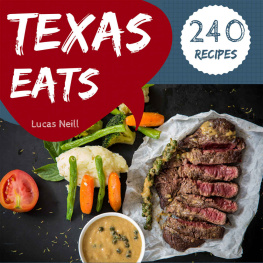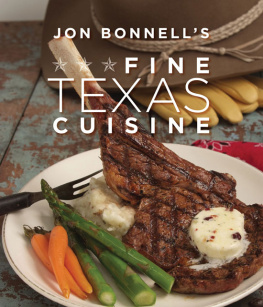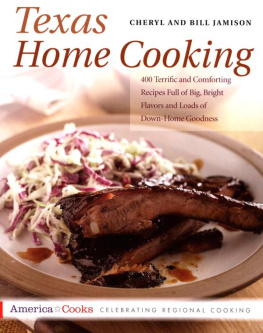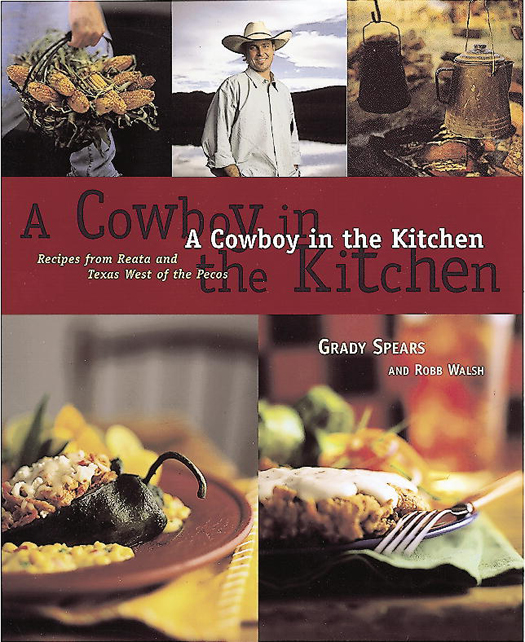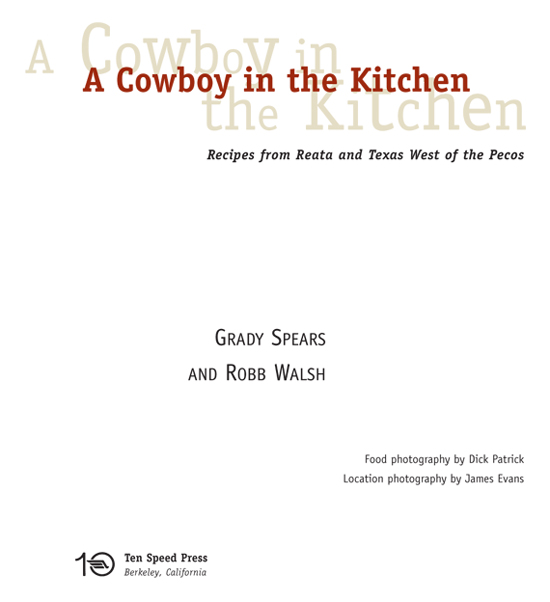Copyright 1998 by Grady Spears and Robb Walsh
All rights reserved. Published in the United States by Ten Speed Press, an imprint of the Crown Publishing Group, a division of Random House, Inc., New York.
www.crownpublishing.com
www.tenspeed.com
Ten Speed Press and the Ten Speed Press colophon are registered trademarks of Random House, Inc.
Library of Congress Cataloging-in-Publication Data
Spears, Grady.
A cowboy in the kitchen: recipes from West Texass Reata Restaurant / Grady Spears and Robb Walsh.
p. cm.
1. Cookery, AmericanWestern style. 2. CowboysTexas, West. 3. Reata Restaurant. I. Walsh, Robb. II. Title
TX715.2.W47S65 1998
641.5978dc21 98-8210
CIP
ISBN-13: 978-1-58008-004-0
Ebook ISBN: 978-1-60774-666-9
Cover design by Catherine Jacobes
Food photography by Dick Patrick
Food styling by Brooke Leonard
Location photography by James Evans
We would like to thank the following firms for their assistance with props for the food photography:
Pris Hodges and Jill OConnor at Prairie Rose
3404 Camp Bowie, Ft. Worth, TX 76107, (817) 332-4369 or (888) 776-7357
El Paso Import Co.
4524 McKinney Avenue, Suite 102, Dallas, TX 75205, (214) 559-0907
v3.1
To my grandfather, W.W. Spears
Acknowledgments
The author wishes to thank Cliff Teinart of the Long X Ranch for the historical background. Brad Whitfield for the sourdough baking tips. Bobby McKnight, Joaquin Jackson, William Billito Donnell and Joe Richardson for their wild stories. Thanks to the talented food professionals who helped shape the recipes in this book, Kris Ackerman, Louis Lambert, Brian Olenjack, Reggie Furgeson, Lupe Sanchez, Robert Hicks, Ed McCowen, Jeff Geren, Mark Rose and all the kitchen staff at Reata Fort Worth and Alpine.
Grady wishes to thank his wife, Sara, for putting up with all of his adventures. Parents George and Susan Spears, Woody and Missy Lawson, and parent-in-laws Jim and Pamela Hammel for all of their support.
The Reata group would like to thank K.C. Sorber for his dedication and all the other people who have contributed to Reatas success, including Mike and Alice Stevens, Richard Burns, Carla Curry, Billy Williams, Clinton Wright, Frank Lopez, Kim Rotan, Tommy Johns, and the guys at Ben E. Keith, Jan, Dell, and Doug.
Many thanks to Big Bend Saddlery, Prairie Rose, and El Paso Imports. Last but not least to the people of Fort Worth and the state of Texas for supporting the cowboy culture.
Preface
Reata means rope in Spanish, but in Texan mythology the word means a lot more. Reata was the name of the ranch in Giant , a book by Edna Ferber that was made into an movie in 1956. The film starred Elizabeth Taylor and James Dean and won nine Academy Awards. In the book and the movie, the Reata Ranch and the cattle culture of the Old West struggle to survive in the brash new economic reality brought on by the discovery of oil.
The tension between the cultures of the Old West and the New West explored in Giant may seem like old hat to the rest of the world by now, but in Texas the theme has a stubborn timeliness. Though most Texans may be far removed from the states ranching heritage and totally subsumed in the electronic global village these days, the cowboy culture remains a touchstone for Texans, continuing to influence the way we think, the way we act, the way we dress, and the way we eat.
Nowhere is our cowboy legacy more carefully preserved or highly regarded than in the Trans-Pecos region. Thanks both to the absence of oil and an environment uniquely suited to large-scale ranching, the Trans-Pecos remains the last preserve of the old-time Texas cattle culture. On the ranches of the Trans-Pecos, things are still done the old-fashioned way, if only to keep the old way alive. Western artwork, saddle making and leather crafts, cowboy poetry, cowboy cooking, and all the other forms of creative expression the Old West gave us continue to thrive in the Trans-Pecos. The Trans-Pecos still looks and feels like the Old West, which is why decades of Westerns, including Giant , were filmed there.
When we decided to open our first restaurant in Alpine, we wanted it to play a part in preserving Western culture. The restaurant serves what we call West Texas cowboy cuisine. Its decorated with the brand of my ranch, the CF, the brands of neighboring ranches, and a collection of authentic Western artifacts.
When it came time to name the restaurant, we decided to call it Reata, after the mythical ranch in Giant and the cattle culture it represented.
AL MICALLEF, CF Ranch
Co-Owner, Reata Restaurants
BACK WHEN I WAS PUNCHING COWS, if youd told me I was going to be a chef someday, I would have doubled up in laughter and fallen off my horse. To tell the truth, I still feel a little funny about calling myself a chef. At the Reata restaurants, weve got guys in the kitchen whove spent years in cooking schools earning their white hats. These guys know French cooking inside out. Me, when I hear somebody say theyre getting out the mandolin, I still expect to hear some country-and-western tunes.
Its only a couple of miles from the stockyards where I used to work as a cowboy to the Reata Restaurant in downtown Fort Worth where I am the head chef, but let me tell you, that couple of miles was a long strange trip.
I never thought Id ever be anything but a cowboy. When I was fourteen, my family lived in Granbury, just outside of Fort Worth. I was always hanging around friends ranches, riding horses and helping with the cattle. I even joined the Future Farmers of America chapter at my high school. One time, the club went to a livestock show in Houston, and I got into the calf scramble.
In a calf scramble, they let ten calves loose and twenty kids run around trying to catch them. If you catch a calf, you get to keep it. Well, I ran around the Astrodome like an idiot, chasing calves until I finally got one. It was red and white and weighed 180 pounds. I was ecstatic, despite the fact that my family lived in a subdivision and there was no way my mama was going to let me raise livestock in the backyard. I talked one of my friends into letting me keep my calf on his ranch.
That calf was my pride and joy. I was going to raise it and win first place at the livestock show. When my folks announced that we were moving into the city of Fort Worth that year, I was so upset about losing my calf that they let me stay in Granbury at my friends ranch until my freshman year was over.
Youd think that moving to the city would have ended my cowboy fantasies, but I just got all the more determined. In my new high school in Fort Worth, I applied for the vocational training program and got a job in the stockyards. I got out of school early a couple of days a week to go down to the Vann-Roach cattle brokerage and chase cattle around. It was dirty workbranding, inoculating, castratingand the Fort Worth stockyards werent exactly the open range. But I figured I was way ahead of everybody else because this was my lifes dream.


